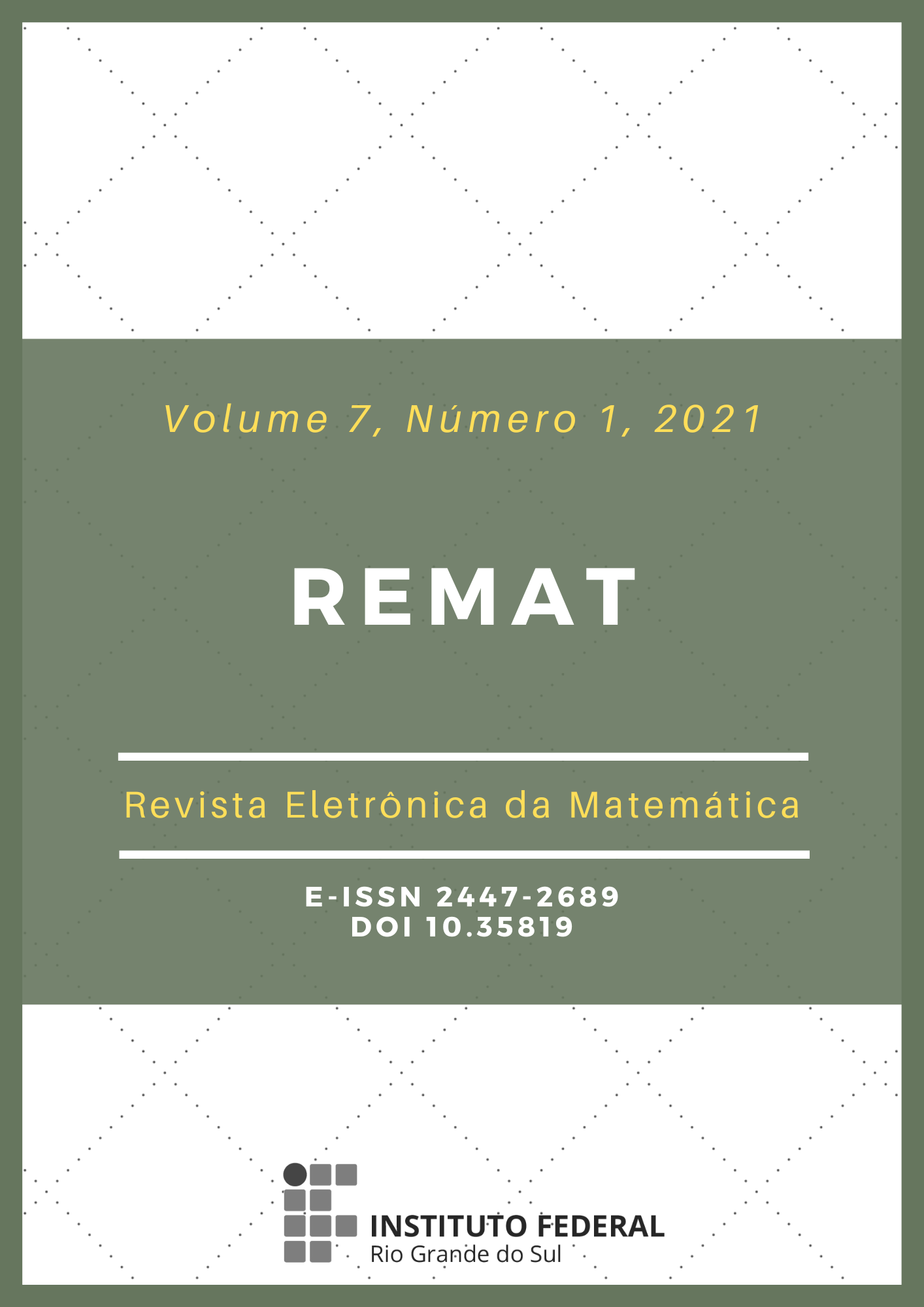Ethnomathematics and the Che-Guevara Rural Settlement: drives for survival and transcendence in the settler’s knowledge/practice
DOI:
https://doi.org/10.35819/remat2021v7i1id4176Keywords:
Ethnomathematics, Rural Settlement, Survival, Transcendence, CultureAbstract
This work refers to a research accomplish with a group of settlers from the Che-Guevara Settlement, situated of the county of Itaberái/GO. The objective was to analyze in social relations (transcendence drive) and productive (survival drive) the presupposed of ethnomathematics in the Che-Guevara settlement. It was mediated by the following questions: How the generation, organization (social and intellectual) and dissemination of knowledge, sometimes mathematized, imbued with sociocultural importance and essential for the permanence those settled in the region, can be observed/witnessed/understood? And from which social institutions, in which the settlers act actively by sharing knowledge and compatible behaviors that identify and characterize as a sociocultural group? To understand that in productive activities and social relations there is exchange of knowledge and practices (sometimes mathematician), asked in this research: What are the processes of generation, organization (social and intellectual) and diffusion from mathematical knowledge in cultural system of Che-Guevara settlement in Itaberaí/GO? Thereunto, we support in D’Ambrosio (2002), main Brazilian researcher on the Ethnomathematics Program and cultural system that constitutes of drive survival and transcendence, Bergamasco and Norder (1996), Medeiros and Leite (1999) about the formation of Brazilian rural settlements and social relations, Bertti (2002) and Araújo (2005) that indicate the settlements as formative institutions, besides Santana (2008) that describes the history of formation from Che-Guevara Settlement and the trajectory of settlers struggle. The methodology that structured the research was based on Ethnography: observations and interviews. By analyzing the interviews, we realize that the settlers do not recognize mathematical knowledge [...]
Downloads
References
ALVES-MAZZOTTI, A. J.; GEWANDSZNAJDER, F. O Método nas Ciências Naturais e Sociais: Pesquisa Quantitativa e Qualitativa. São Paulo: Pioneira, 1998.
ANDRÉ, M. E. D. A.; FAZENDA, I. (Orgs.). Metodologia da pesquisa educacional. 12. ed. São Paulo: Cortez, 2010.
ANGROSINO, M. Etnografia e Observação Participante. Tradução de José Fonseca. Consultoria, supervisão e revisão técnica de Bernardo Lewgoy. Porto Alegre: Artmed, 2009.
ARAÚJO, J. P. de. Os Assentamentos Rurais de Reforma Agrária: novos espaços educativos no campo brasileiro. In: CONGRESSO NACIONAL DE EDUCAÇÃO DE PESSOAS ADULTAS, 2, São Carlos, jun. 2005. Anais [...]. São Carlos: CREPA/UFSCar, 2005. Disponível em: http://www.crepa.ufscar.br/documentos/arquivos/ii-crepa/c1_t32/view. Acesso em: 20 dez. 2020.
BERGAMASCO, M. S.; NORDER, L. A. C. O que são assentamentos rurais. Coleção Primeiros Passos. 87 p. São Paulo : Brasiliense, 1996.
BERTTI, M. S. Memória Coletiva e Educação em Assentamentos Rurais Goianos. Orientador: Jadir de Morais Pessoa. 2002. 146 f. Dissertação (Mestrado em Educação) - Programa de Pós-Graduação em Educação, Faculdade de Educação, Universidade Federal de Goiás, 2002.
BRASIL. Lei n° 4 504, de 30 de novembro de 1964. Dispõe sobre o Estatuto da Terra e dá outras providências. Diário Oficial da União, Brasília, DF, 30 nov. 1964. Disponível em: http://www.planalto.gov.br/ccivil_03/leis/L4504compilada.htm. Acesso em: 20 dez. 2020.
D’AMBROSIO, U. Etnomatemática: Arte ou técnica de explicar e conhecer. São Paulo: Ática, 1990.
D’AMBROSIO, U. Ethnomatematics and its first international congress. Zentralblatt fur Didaktik der Mathematik, v. 32, n. 2, p. 50-53, 1999.
D’AMBROSIO, U. Etnomatemática: elo entre as tradições e a modernidade. Coleção Perspectivas em Educação Matemática. Belo Horizonte, MG: Autêntica, 2002.
FIORENTINI, Dario; LORENZATO, Sergio. Investigação em educação matemática: percursos teóricos e metodológicos. 3. ed. rev. Campinas, SP: Autores Associados, 2012.
FLICK, I. Introdução à pesquisa qualitativa. 3. ed. Porto Alegre: Artmed, 2009.
GABOARD JÚNIOR, A. A Importância da Produção na Agricultura Familiar para a Segurança Alimentar. In: JORNADA QUESTÃO AGRÁRIA E DESENVOLVIMENTO, PROJETOS SOCIAIS E POLÍTICAS PÚBLICAS, 2., Paraná, nov. 2013. Anais [...]. Paraná: Universidade Federal do Paraná, 2013.
KNIJNIK, G. Currículo, Etnomatemática e Educação Popular: um estudo em um assentamento do Movimento Sem-Terra. Reflexão e Ação: Revista do Departamento de Educação da Universidade de Santa Cruz. v. 10, n. 1, jan./jun. 2002. Disponível em: http://etnomatematica.org/articulos/reflexao101.pdf. Acesso em: 18 nov. 2018.
KNIJNIK, G. Currículo, Etnomatemática e Educação Popular: um estudo em um assentamento do movimento sem terra. Currículo sem Fronteiras. v. 3, n. 1, p. 96-110, jan./jun. 2003. Disponível em: http://www.curriculosemfronteiras.org/vol3iss1articles/gelsa.htm. Acesso em: 22 fev. 2021.
LÜDKE, M.; ANDRÉ, M. E. D. A. Pesquisa em Educação: abordagens qualitativas. São Paulo: EPU, 1986.
MACHADO, V. L. Modernização agrícola no médio norte goiano: a feira como estratégias de sobrevivência do pequeno produtor rural. Orientador: Jadir de Morais Pessoa. 2014. 206 f. Tese (Doutorado em Educação) - Universidade Federal de Goiás, Goiânia, 2014. Disponível em: http://repositorio.bc.ufg.br/tede/handle/tede/4097. Acesso em: 20 dez. 2020.
MEDEIROS, S. L.; LEITE, S. A formação dos assentamentos rurais no Brasil: processos sociais e políticas públicas. Porto Alegre: UFRGS, 1999.
MELO, T. B.; FANTINATO, M. C. C. B.; THEES, A. SILVEIRA, A.; SOARES. G. A. O. Programa Etnomatemática como Humanizador do Ensino de Matemática. In: CONFERÊNCIA INTERAMERICANA DE EDUCAÇÃO MATEMÁTICA, 13, Recife, jun. 2011. Anais [...]. p. 1-11. 2011. Disponível em: https://xiii.ciaem-redumate.org/index.php/xiii_ciaem/xiii_ciaem/paper/viewFile/1376/1092. Acesso em: 20 dez. 2020.
MENDONÇA, L. H. S. O meio ambiente na visão das crianças do assentamento “Chê Guevara” Itaberaí-GO. Orientador: Ana Maria Curado Lins. 53 f. 2001. Monografia (Licenciatura Plena em Geografia) - Universidade Estadual de Goiás, Campus Cora Coralina, Cidade de Goiás, 2001.
MINAYO, M. C. S. Pesquisa social: teoria, método e criatividade. Séries Manuais Acadêmicos. Petrópolis, RJ: Vozes, 2016.
PASSOS, C. M. Etnomatemática e Educação Matemática Crítica: conexões teóricas e práticas. Orientadora: Jussara de Loiola Araújo. 150 f. 2008. Dissertação (Mestrado em Educação) - Faculdade de Educação, Universidade Federal de Minas Gerais, Belo Horizonte, 2008.
SANTANA, M. L. A luta pela posse da terra no projeto de assentamento Chê-Guevara no município de Itaberaí-GO e sua realidade sócio-economica e ambiental. Orientador: José Braga Coelho. 99 f. 2008. Monografia (Licenciatura em Geografia) - Universidade Estadual de Goiás, Campus Cora Coralina, Cidade de Goiás, 2008.
SANTOS, N. F. Assentamento Rural: Juventude e Trabalho. Orientador: Jordão Horta Nunes. 94 f. 2007. Dissertação (Mestrado em Sociologia) - Faculdade de Ciências Humanas e Filosofia, Universidade Federal de Goiás, Goiânia, 2007.
SILVA, J. P. Conexões entre Etnomatemática e Educação do Campo: um estudo no Colégio Estadual Assentamento Virgilândia. Orientadora: Susanne Tainá Ramalho Maciel. 51 f. 2013. Monografia (Licenciatura em Educação do Campo) - Faculdade UnB Planaltina, Universidade de Brasília, Planaltina, 2013.
SPRADLEY, J. The Ethnographic Interview. New York: Holt, Rinehart and Winston, 1979.
Downloads
Published
Issue
Section
License
Copyright (c) 2021 REMAT: Revista Eletrônica da Matemática

This work is licensed under a Creative Commons Attribution 4.0 International License.
REMAT retains the copyright of published articles, having the right to first publication of the work, mention of first publication in the journal in other published media and distribution of parts or of the work as a whole in order to promote the magazine.
This is an open access journal, which means that all content is available free of charge, at no cost to the user or his institution. Users are permitted to read, download, copy, distribute, print, search or link the full texts of the articles, or use them for any other legal purpose, without requesting prior permission from the magazine or the author. This statement is in accordance with the BOAI definition of open access.













 https://orcid.org/0000-0002-0893-7426
https://orcid.org/0000-0002-0893-7426


















